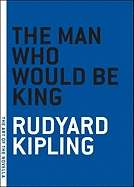The Man Who Would Be King

Editorial Melville House Publishing
Fecha de edición abril 2005 · Edición nº 1
Idioma inglés
EAN 9780976140702
64 páginas
Libro
encuadernado en tapa blanda
Resumen del libro
"My gord, Carnehan," says Daniel, "This is a tremenjus business, and we've got the whole country as far as it's worth having."
Literature's most famous adventure story, this stirring tale of two happy-go-lucky British ne're-do-wells trying to carve out their own kingdom in the remote mountains of Afghanistan has also proved over time to be a work of penetrating and lasting political insight--amidst its raucous humor and swashbuckling bravado is a devastatingly astute dissection of imperialism and its heroic pretensions.
Written when he was only 22 years old, the tale also features some of Rudyard Kipling's most crystalline prose, and one of the most beautifully rendered, spectacularly exotic settings he ever used. Best of all, it features two of his most unforgettable characters, the ultra-vivid Cockneys Peachy Carnahan and Daniel Dravot, who impart to the story its ultimate, astonishing twist: it is both a tragedy and a triumph.
The Art of The Novella Series
Too short to be a novel, too long to be a short story, the novella is generally unrecognized by academics and publishers. Nonetheless, it is a form beloved and practiced by literature's greatest writers. In the Art Of The Novella series, Melville House celebrates this renegade art form and its practitioners with titles that are, in many instances, presented in book form for the first time.
Contributor Bio: Kipling, Rudyard
Rudyard Kipling(1865-1936), recipient of the Nobel Prize for Literature in 1907, was an English novelist, short-story writer, and poet. His sweeping tales of adventure, including "Kim, Captains Courageous, " and "The jungle Book", won him wide popularity during his lifetime and have been beloved by generations.
Biografía del autor
(Bombay, 1865 - Londres, 1936) escribió relatos, ensayos, novelas y poesía, aunque la mayor parte de su producción son cuentos, género en el que es un absoluto maestro. Iniciado en la masonería a los veinte años, en la logia Esperanza y Perseverancia Nº 782 de Lahore, Punjab, India, su literatura abarca todos los territorios y géneros, pero sobre todos en sus primeros años arroja luz sobre la colonización inglesa de la India. Rechazó el Premio Nacional de Poesía y en tres ocasiones la Orden de Mérito del Reino Unido, que conlleva el título de Sir, lo que contradice su supuesto afán por el imperislismo colonial. Aceptó, sin embargo, el Premio Nobel en 1907. Entre sus obras aparecen libros de relatos como El hándicap de la vida (1891), El libro de la selva (1894), Stalky x{0026}amp; Co. (1899), Puck de la colina de Pook (1906), La casa de los deseos (1926) y las novelas La luz que se apaga (1891), Capitanes intrépidos (1896) y Kim (1901). Su autobiografía, Algo de mi mismo (1937) se publicó póstumamente un año después de su muerte.







